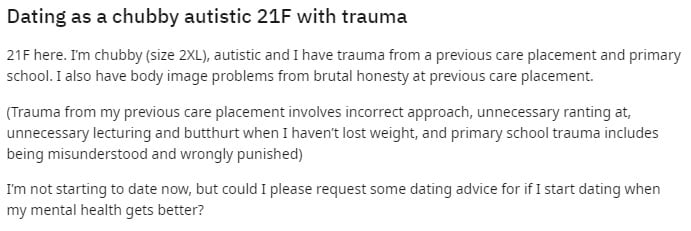How To Date With Trauma – 3 Ways To Keep Baggage From Interfering
Successfully dating with trauma requires self-awareness, emotional regulation, and proactive healing rather than relying on a partner to fix past wounds.
About this article:
Overview:
It would be nice if we could enter every new development in our lives with a clean slate. Unfortunately, real life often doesn’t allow it. Baggage springs up from our past experiences and, for better or worse, it bleeds into new situations and new relationships. I recently answered a question on Reddit about how someone with traumatic experiences in their past could ever move on and try to date again. They essentially wanted to work out how to date with trauma weighing them down. You can see the question below or read the thread on dating after trauma here:
Tags:
Uncategorized
Topics:
Dating, Trauma, Self-Respect, Emotional Baggage, Triggers
Date:
Author(s):
Cain Parish

I offered some advice, but it felt hollow to discuss such a complicated topic in the brief space one is allowed inside a Reddit comment. This article is my attempt at providing a bit more detail to those who need it.
Dating With Trauma & How to Think About It
Dealing with emotional baggage, regardless of the context, is a game of comprehension and foresight.
Most people don’t have a very clear picture of what their emotional baggage is, or how to even comprehend it. It takes effort to wrap your head around the idea that you have stuff in your psyche cluttering up your mental bandwidth.
Let’s see if we can find a good model for these things.
It’d be easier if they taught these things in school, right? Imagine going to ‘How to Date With Trauma 101’.
(To be clear I don’t mean going on a date with trauma – I mean learning to cope with your baggage, so you can, yknow, date with trauma.)
What Are Mental Associations?
When we go through a negative experience, we retain an association. It’s how we remember not to touch hot stoves – we associate the pain of a past burn with the hotplate in our kitchen. Most of these associations are useful and harmless, simple associations that just let our brain store information more easily.
For example, liking particular foods, thinking bed is comfy, having warm and fuzzy feelings about our comfort show – these are all very mundane associations that serve their purpose – to attach contextual emotions to a particular external stimulus.
However, when we go through a formative or traumatic event with a very negative context, the associations we create aren’t so nice. Being cheated on, betrayed or abandoned are all very typical traumatic events that leave us reeling – and cause us to associate the events leading up to the trauma with the subsequent pain.
This is how we pick up emotional baggage. Essentially, our baggage is the cluster of overdramatic associations that find danger in unrelated, new situations.
Unfortunately, baggage is not a conscious choice. Your brain has a much different idea of what is dangerous than you do. We are hardwired to seek out pleasure and avoid pain, and traumatic events are the worst case scenario. All our defense mechanisms come rushing in to try and prevent a similar situation from occurring again. This is why it’s hard to date with trauma – we find ourselves avoiding new situations because of old issues.
This is why we find ourselves seeing red flags where they don’t actually exist. If you’ve ever found yourself weirdly sensitive to otherwise normal behaviour from a partner or friend, it’s because they (probably inadvertently) reminded your subconscious of the baggage we keep around as a defense mechanism.
Determining Your Baggage
It becomes easier to understand all these concepts if we can find a way to identify our personal issues on the subject. The best way to understand baggage is to identify your own. Unfortunately, that’s easier said than done. There’s a degree of detective work involved to figure out what our particular pain points are.
Here are a few questions you can ask yourself to narrow down on your particular negative associations:
- Do I have any particular events in my past that I suspect left a mark on me?
- Am I aware of any weird reactions I have to conflict or conversations – going cold, feeling in danger, anger, outbursts, feeling an urge to leave a situation
- Have I had any averse reactions pointed out to me by past partners? Can I trust their opinions?
- Do I ever feel myself acting out of fear or anxiously perceived issues?
- What are the common themes in my traumatic past that seem to come up in all my relationships?
Your mind is pretty good at connecting the dots here. The odds are pretty good that your first instinctive answer to many of these questions is the right one. You can learn more about developing your intuition for self-reflective purposes here.
You’ll end up with a list of potential triggers – this is a good jumping off point to go forward with. The key here is self-awareness, understanding what bugs you and why.
For example, some stuff you might recognise about yourself could look like this:
- I struggle with my partner having friends of the opposite gender because I’ve had issues with infidelity in the past.
- I have a hard time raising issues or holding boundaries because my past partner would shut me down and be hostile.
- I find it difficult to be emotionally vulnerable because I’m used to people leaving me when I open up.
If you think of anything and feel a rush of emotion, you’re on the right track. Follow the trail, and ask yourself why you’re bothered by the things that make you feel icky. That’s how we figure out what our baggage is.
So How Do We Date With Trauma?
Cool, so we have a general idea of what our issues are – maybe you’ve narrowed in on things that bother you, or patterns from past life experiences. Step two is figuring out what to do with that information going forward.
Being Mindful of Triggers
The hard part in all of this is being in the moment – your intentions might be all well and good but when your triggers overwhelm you all the planning goes straight out the window. It’s hard, but possible, to intervene and stop yourself before your behaviour is affected by your mental situation.
The key is developing a skill which is known as mindfulness.
That might be a buzzword too often thrown around to some people, but in day-to-day practice, it can be a really effective tool for beating your negative associations and developing new behaviours, like learning how to date with trauma.
The significance behind mindfulness is in its ability to present you with more time between stimulus and response. To make that super clear, mindfulness is a skill that allows you to experience something triggering, pause, and consider your response BEFORE it comes out – before the emotions and defense mechanisms get in the way.
Unfortunately, it’s not a particularly easy answer – there are no silver bullets here. You simply have to practice being as aware of your patterns as possible, and trust that your pattern recognition will do its job.
The more situations you’re faced with where your mind feels it’s re-engaging with a traumatic experience, the more opportunities you have to develop some mindful habits and develop your awareness of the problem. Maybe, with some self-reflection, you find a new trigger, or gain a new understanding of your issue. The more you can be aware of and identify the circumstances leading up to being triggered, the better a chance you have of that self-awareness asserting itself BEFORE you have the emotional response – before you actually become triggered.
Old Baggage For New Situations
I would be remiss if I didn’t recommend a mindset. Your attitude towards your situation, your trauma and your baggage is not conducive towards a new relationship. There’s no nuance to it. If this is an issue you struggle with – where your past experiences are bleeding over to your new relationships and you feel powerless to stop it, then you are simply not set up for success at the moment. You can’t date with trauma that’s out of control.
That’s okay. You just have to understand what it all means.
Specific issues usually manifest as people craving or needing a particular kind of partner or a particular type of relationship. If they find themselves with someone not meeting those needs, or worse, inadvertently hitting their triggers, the relationship is usually heading for disaster.
There are two components to this. Firstly, the need for genuine self-care. If you have already identified you’re in the habit of self-sabotaging, you need to be doing your best to help heal from the issue. That might look like therapy, journaling, exercise, self-reflective practices, whatever works to help you build your foundations.
Secondly, you need to be aware that a relationship will make things harder, not easier. It’s tougher to heal from difficult baggage when you have a person right next to you that is able to soothe you and band-aid up your weak spots. If you want to genuinely move on from these issues, you can’t just find someone that’s able to withstand the current situation – you need to build yourself a foundation and develop a real, genuinely healthy relationship.
The two aren’t mutually exclusive, but goddamn is it harder. Your partner isn’t your therapist. They should not be expected to take the burden of your previous experiences. It’s your job to heal from those wounds and to not bring them forward into new adventures.
Conclusion
Living with trauma by yourself is hard. Bringing another person into that hot mess is even harder. The best advice I can provide is to know yourself – to understand what issues might crop up in your future relationships, what to watch out for, and what you can do to heal from it and move forward.
Trying to date with trauma should (hopefully) never be the goal. Your destination should be something healthier, as free as possible from those outdated defense mechanisms and fear-based associations. If you know what to watch out for, what conversations to have, and what to avoid, you’ll be much more likely to develop strong relationships and appropriate boundaries. Good luck.
F.A.Q.s
Can someone with a traumatic past successfully date again?
Yes, although it’s challenging, individuals with traumatic experiences can date again. The key is understanding and managing one’s emotional baggage, recognizing triggers, and practicing mindfulness to respond rather than react to situations that may remind them of past traumas.
What is emotional baggage, and how does it affect new relationships?
Emotional baggage refers to the negative associations and responses developed from past traumatic events. These can lead to misinterpreting new situations or perceiving dangers that aren’t present, thereby affecting new relationships negatively by triggering defensive or adverse reactions to otherwise normal behavior.
How can one identify and deal with their emotional baggage when dating?
Identifying emotional baggage involves introspection to recognize one’s triggers, which are often linked to past traumas. Dealing with it requires practicing mindfulness to create a pause between being triggered and reacting, thereby allowing for a more thoughtful response. Additionally, self-awareness and self-care, including therapy and self-reflective practices, are crucial for healing and preparing oneself for healthier relationships.
Stay informed
Receive updates on new research, book releases and insights into strategic communication and personal culture.
No spam. Unsubscribe anytime. Your information is never shared.
